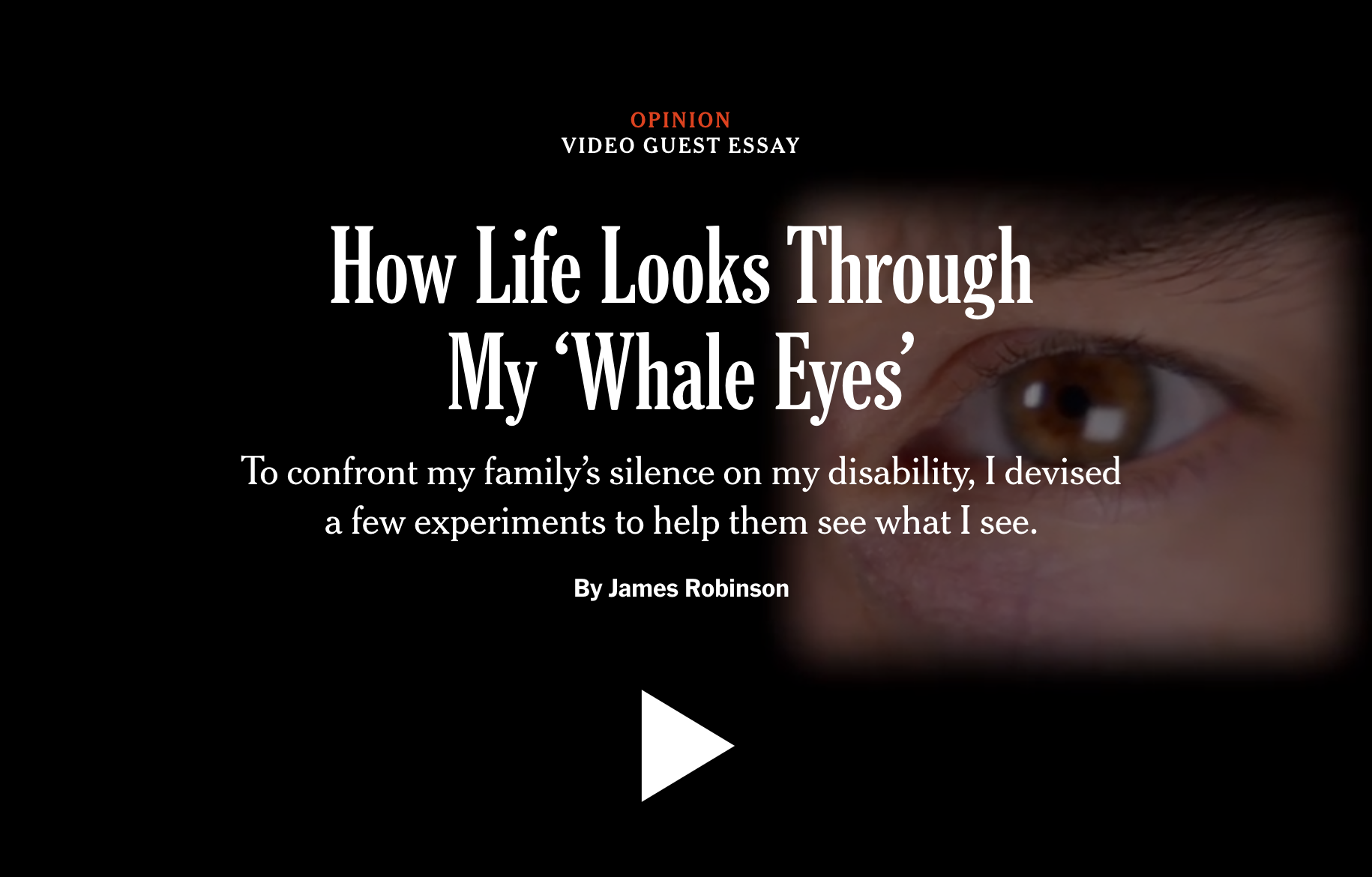I’m interrupting my regularly scheduled summer compilation programming to bring you breaking news. Well, I only wish it were breaking. Rather, this is an unforgettable, majestic and poignant spin on a tale which is, sadly, as old as time: how being made to feel different feels so lousy.
James Robinson’s exquisite video: How Life Looks Through My ‘Whale Eyes’, however, elevates this classic tale to my highest level of achievement. Yes, he’s made “Sesame Street.” Robinson’s taken a complex, uncomfortable and challenging situation, and made it simple, accessible and relatable.
Hats off to you James. I love that you not only share your difference, but talk about the most important next step…WHAT I CAN DO ABOUT IT. Thank you for your bravery, honesty and wisdom. I hope our paths might cross someday. I’m always trying to jump off the U.S.S. Normal myself.
Readers, I’ve just spent at least an hour watching and re-watching to try to pick a favorite line. I ended up transcribing most of the video. Feel free to read my words, but they do the video NO JUSTICE. Go and watch it. Watch it with your family. Watch it at work. Watch it alone. Tell others.
My 24 “Favorite” Lines (well, 5…)
That said, since I spent all that time watching the video, here are my “favorite” lines. All 24 of them. I’ve highlighted five to make it simpler to read. I probably left out some other good ones. I can’t wait to watch it again.
“Having eyes like mine, well, it feels like everyone I meet is frolicking happily on the ship they’ve dubbed the U.S.S. Normal.
And then here I am, below the surface, feeling a bit isolated. ”
But whenever I get up near the surface, where the people on the U.S.S. Normal can see me, everyone starts acting a little weird. They get nervous. They don’t know what to do, so they just avoid looking into the ocean altogether. Even my own family. My brother has sat across from me at the dinner table for his entire life. In that whole time, he never got up the courage to ask me what was happening with my eyes.
I used to also believe that this conversation was best avoided. I used to lie to people about the name of my condition, telling them that it was a lazy eye. Not because this was true but instead because it was something that they would have heard of.
But the thing is, I don’t really think that’s productive anymore.
And that’s why we need to talk.
“If you’re going to spend your whole life aboard this ship, then I want to tell you a little bit about how you can meaningfully interact with what else is out there in the ocean.”
The name of my condition is strabismus. I’m an alternator with extropia, and I have a complication called A.R.C. All of that is hard for even me to remember. So that’s why, a couple of years ago, I just started calling them whale eyes.
Both my eyes worked individually. It’s just at the collaboration stage when they get a little confused. So, I started switching back and forth. You see my eyes were never actually lazy, it was just my brain got confused.
The most popular form of vision correction [for this condition] is surgery…I had it twice, and the doctor missed both times.
“In the U.S., as soon as you’re born into the ocean of difference, people to start fishing you out.
I was like a fish that kept getting caught, taken into a boat, and then wiggling its way back into the ocean.”
What all these failures meant is that I was going to have to grow up with whale eyes, overboard in the sea of difference.
[Ed. note: I couldn’t bring myself to transcribe most of the baseball story. It felt too reductive.] Almost everyone hits it the first time off the tee. I got my two chances and I missed, both times. And I remember the umpire didn’t know what to do because he had clearly never seen someone strike out in tee ball.
My strikeout was just one of thousands of humiliations in which others didn’t know how to react to my whale eyes.
“We put so much time and effort into making sure that people who are perceived as different understand what it would be like if they were normal.
But we rarely ever do the opposite.
Pushing those who see themselves as normal to understand what it would be like if they were different. ”
Now, my way of perceiving the world might seem strange and frustrating to you. But if you come below the surface, you’ll see that I’ve adapted.
In all honesty, I don’t have a problem with the way that I see. My only problem is with the way that I’m seen. I just want to be able to connect with people.
It’s hard to tell where I’m looking. I get it. It’s not just, “Where is he looking?” It’s like, “Where is he?” I’m still here. You are just having trouble connecting to that person.
“You want to know why I call them whale eyes?
It’s because we love looking at whales, and we’re completely unbothered by the fact that we can only look into one of their eyes at a time.
That’s the kind of acceptance that I’ve always craved. ”
But I’m not a whale.
And this whole thing about the sea of difference, it’s just a metaphor. I really live in your world.
It’s because I really live in your world that I need your help overcoming this distance between us.
That means looking back into whichever eye is looking at you and meeting those inevitable gaffes with patience.
More than anything, what I really hope you’ll understand is that what for you is a few seconds of discomfort, for someone else is just one in a lifetime of little moments that have made them feel like they’re hundreds of meters below the surface, even though they’re really just standing a few feet in front of you, waiting to connect.
PS: Sept 2025
“Whatever we look at, and however we look at it, we see only through our own eyes.”







